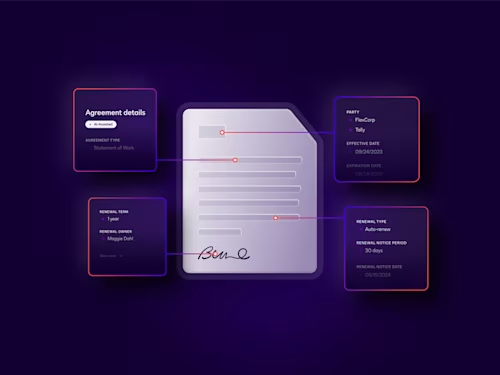
Understand and Overcome the Challenges of Clause Management
We asked enterprise companies about their experience with clause management, from drafting and approvals to revisions and storage.

Technology has changed the way businesses manage their agreements, increasing the pace of contracting and visibility into the contract process. But for many enterprise companies, a lack of centralization, automation and other technological advantages still holds them back from realizing the full benefits of digital transformation. This is an especially prevalent problem when it comes to managing contract clauses.
A clause library is a collection of pre-approved contract clauses that employees can choose from if the standard clause is unacceptable to the other party. It can save valuable time by minimizing the need to have legal teams get involved in routine changes to contracts.
An effective clause strategy allows agreements to move forward quickly and limit risk exposure in high-stakes matters like payments and contract termination. But today, blocks of legal text are too often spread out across platforms and spreadsheets, disorganized, out-of-date and out of reach—with firms risking contracting delays, inaccuracies and non-compliance.
As part of our ongoing effort to innovate and improve our product experience, we asked enterprise companies about their experience with clause management, from drafting and approvals to revisions and storage. See what we learned about the major obstacles and challenges—as well as how a unified, automated clause library can help.
The top clause management challenges
When just one clause update can take several steps and widespread approvals, manual and time-consuming revision and storage processes can quickly chew up time and resources. Docusign research reveals that larger customers universally experience the following three major hurdles in managing agreement language.
1. Absence of centralization
Decentralized clause storage produces a host of difficulties for large organizations with sprawling contract needs—especially when it comes time to pinpoint and review specific sections of legal text. With clauses spread across systems and documents, attorneys have to spend significant time searching for any given clause.
When organizations need to delete or alter a clause embedded in widespread agreement templates, they find themselves sifting through scattered documents to find the applicable contracts. When limited to just a few agreements, the process may be inefficient, but it’s still relatively manageable. However, when contracts stretch into the thousands, this decentralized system starts to take a heavy toll on contracting speed and accuracy. Decentralization also makes it increasingly difficult for each member of the legal team to determine how other team members have already changed the clause content.
What’s more, when agreements are located in numerous folders and spreadsheets, companies can find themselves in a position where they don’t even have visibility into their sales and procurement obligations—from vendor relationships to payment terms to service agreements. For one large healthcare organization with several vendor agreements across multiple locations, a scattered storage approach and lack of oversight contributed to both increased redundancies and costs.
2. Lack of automation
According to Docusign research, many companies manage their agreements with little or no automation to assist them. Specifically, they lack the tools to quickly identify legal language across their agreement portfolio and eliminate manual clause updates. When it comes to updating outdated clauses—accommodating new corporate responsibility policies; interest rates; payment or sales terms; state or federal laws; company policies; procurement updates; or other changes—firms face a lengthy revision process and a high likelihood of human error, especially when these changes affect a large proportion of their agreements.
Beyond time investments, the absence of automation also increases the risk of contract inconsistencies. The majority of research participants did not have a central library for managing blocks of legal text, forcing them to manually review the clauses in every agreement type in order to root out errors, which could lead to potential compliance vulnerabilities. Even those with access to a clause library found that limited automation tools left them with no resort for updating legal text save manual intervention, an especially difficult prospect when dealing with agreements in multiple languages or identifying non-compliant clauses buried within long contracts.
3. Agreement complexity
Especially for enterprises, complicated agreements and nuanced legal language are a major roadblock to accelerating contracting and reducing risk. Some organizations manage several hundred contracts, as well as language variations. Depending on how many geographies a company works with, they could have clauses written in as many as four to five languages.
When coping with vast agreement complexities, including sales contracts with detailed negotiated terms, it quickly becomes difficult to account for all contract obligations—and ensure clauses are up to date with evolving regulations. For example, the California Privacy Rights Act (CPRA) implemented in 2023, instituted new requirements related to consumer data privacy. These new regulations call for active clause management and oversight—a difficult task without a central clause library and automation assistance.
The power of clause libraries: bringing unity and ease to the agreement process
When disorganized and inaccurate clauses start hurting a business’s ability to operate efficiently and its reputation, compliance status and vendor relationships, a centralized, automated clause library offers a transformative solution, heralding a new era of contract organization and ease. Docusign CLM empowers organizations with their own clause library that puts agreement language in one place—making it easier to find, revise and standardize accurate and compliant clauses.
For organizations coping with an incomplete digital transformation—hampered by manual tasks, scattered contracts and frequent negotiations—Docusign CLM’s embedded clause library allows employees to manage agreements with efficiency and minimal legal risk. With automation on their side, firms can better understand their current contract obligations, craft accurately detailed agreements, and nimbly adapt clauses to meet changing regulations, priorities and offerings.
Contact Docusign to start building a library of clauses that support your business goals and dynamic contract needs.
Related posts
Docusign IAM is the agreement platform your business needs


